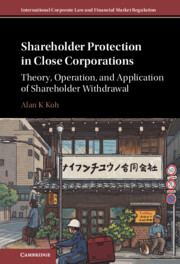 Shareholder Protection in Close Corporations
Shareholder Protection in Close Corporations Book contents
- Shareholder Protection in Close Corporations
- International Corporate Law and Financial Market Regulation
- Shareholder Protection in Close Corporations
- Copyright page
- Dedication
- Contents
- Figures and Tables
- Preface
- Acknowledgements
- Abbreviations
- I Introduction
- Part 1 Theory
- II The Concept of Withdrawal
- Part 2 Operation
- Part 3 Application
- Part 4 Conclusion
- Bibliography
- Cases
- Legislation
- Index
II - The Concept of Withdrawal
from Part 1 - Theory
Published online by Cambridge University Press: 14 October 2022
- Shareholder Protection in Close Corporations
- International Corporate Law and Financial Market Regulation
- Shareholder Protection in Close Corporations
- Copyright page
- Dedication
- Contents
- Figures and Tables
- Preface
- Acknowledgements
- Abbreviations
- I Introduction
- Part 1 Theory
- II The Concept of Withdrawal
- Part 2 Operation
- Part 3 Application
- Part 4 Conclusion
- Bibliography
- Cases
- Legislation
- Index
Summary
The Book’s theoretical core, Chapter II focuses on two fundamental concepts: the close corporation, and withdrawal. After explaining the close corporation’s distinctive features, I set out its cardinal problems: conflict between minority and majority shareholders, and the enhanced risk of inter-shareholder exploitation. Over time, leading jurisdictions have converged upon shareholder exit as the ultimate solution to shareholder conflict. This Chapter introduces the concept of ‘withdrawal remedies’ as legal mechanisms enabling voluntary shareholder exit from the corporation coupled with an enforceable monetary claim for the value of the withdrawing shareholder’s membership interest. I show how withdrawal remedies are the only class of solutions that 1) resolve intractable conflict and 2) protect minority shareholders. Reasons why shareholders (minority and majority) might find access to withdrawal desirable – and why they might not – are analysed by applying insights and concepts from behavioural law and economics such as ‘sticky defaults’ to the close corporation withdrawal context.
Keywords
- Type
- Chapter
- Information
- Shareholder Protection in Close CorporationsTheory, Operation, and Application of Shareholder Withdrawal, pp. 19 - 62Publisher: Cambridge University PressPrint publication year: 2022
